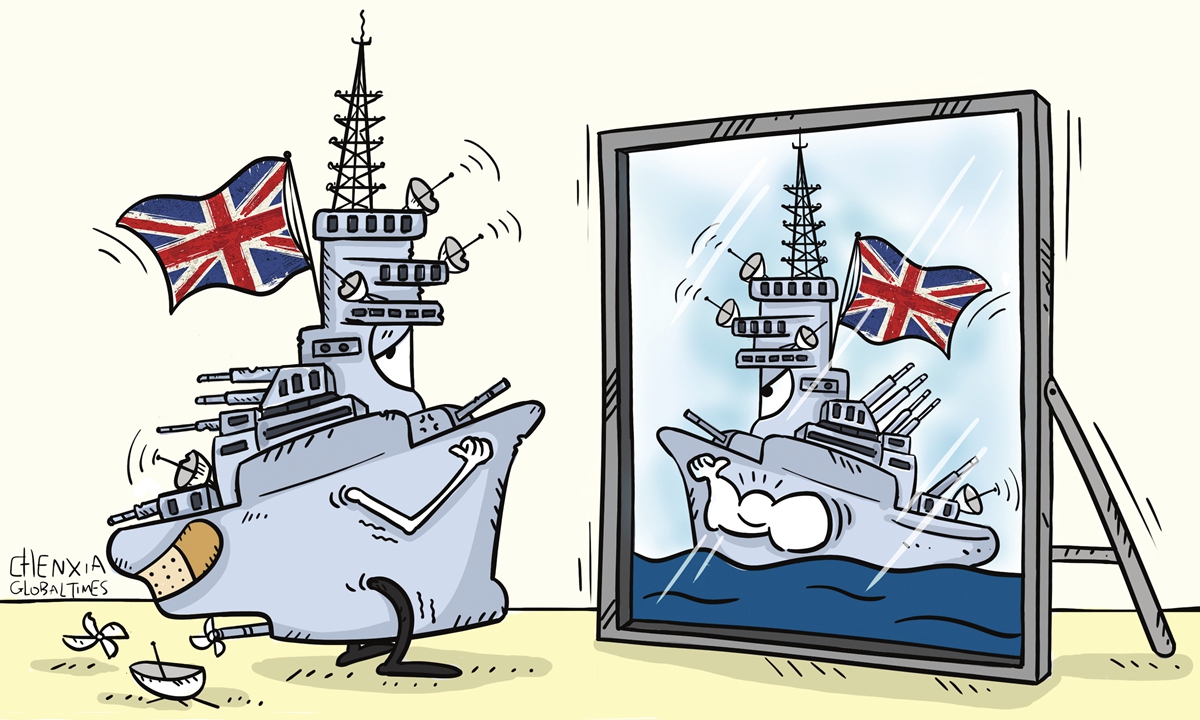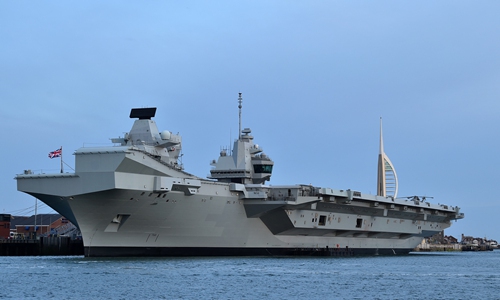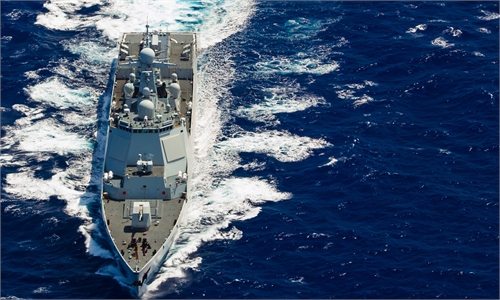Showing off its tier-2 naval power, Britain can hardly affect regional affairs in Asia

Illustration: Chen Xia/GT
The UK and Japan on Tuesday held a joint naval drill in the Pacific Ocean south of Okinawa Island, Japan's Defense Ministry was quoted as saying in a report by Tokyo-based Kyoto News on Wednesday.
Both the US and Dutch naval vessels accompanying the British strike group also participated in the drill.
Britain's HMS Queen Elizabeth is sailing in the Asia-Pacific region, and has participated in navy drills with regional countries like Japan. This idea is to cooperate with the US' strategic alignment for the Indo-Pacific. Washington wants to rebuild a new alliance system led by the US, and is demanding corresponding practices from its allies such as Japan and the UK. In this context, when sailing to Asia, the UK' warships are bound to hold joint military exercises with Japan and the US.
Besides, during the drills, the UK may have shared its experience on how to steer aircrafts. It has been reported that Japan intends to modify its Izumo helicopter destroyer to operate F-35B fighters, the same as UK's HMS Queen Elizabeth has. Japan may hope to learn experiences on the F-35B from the UK and the US, laying the groundwork for their subsequent joint military operations.
An article run by the Diplomat magazine on July 30 indicated that one of the missions of HMS Queen Elizabeth maiden deployments in the Asia-Pacific region is to show strength to China. Actually, Britain's maritime power is weaker than China's. The UK's attempt to use an aircraft carrier strike group to project its strength and show its might to China is completely beyond its ability.
The UK used to be the foremost naval power in Europe. During the colonial period, British warships effectively dominated and deterred its colonies and semi-colonies. But things are different now. Currently, the UK's navy clout can only be classified as a second-tier member. But China is in the first tier. It is futile to flex its muscle by virtue of its maritime strength to China.
In July, the UK announced that it would permanently deploy two warships - HMS Spey and HMS Tamar - in Asia. Both ships are actually only offshore patrol vessels without even a missile. This means that they will most likely patrol in Asian waters. Therefore, the deployment of these two ships is only to maintain the UK's presence in Asia. The UK simply doesn't have the ability to intervene in regional hot spot issues.
In addition, the US has proposed the Indo-Pacific Strategy and hopes that NATO members will put their military forces toward Asia as much as possible. As a country that has a "special relationship" with the US, the UK definitely wants to help it out. However, it doesn't have enough strength to do so. Thus, it decided to send two patrol ships without strong combat capabilities to Asia to make up the number. Overall, the symbolic significance of the decision outweighs its practical importance.
Regardless of showing off its presence in Asia, the UK will not effectively and significantly affect regional affairs. Some Southeast Asian countries may have some defense cooperation with the UK. But London is not capable of influencing their domestic and foreign affairs, as well as their military strategies. Even if the UK from time to time sends warships or carrier strike groups to Asian waters, those activities are only short-term. They have very limited influence on the regional situation, if any whatsoever.
The US hopes that Britain can set an example for other NATO members in cooperating with the US' strategy in Asia, such as making some practices directing at China. In order to realize the goals in its Indo-Pacific Strategy, it cannot rule out a scenario where Washington will ask its other European allies, such as Germany and France, to do what the UK's Royal Navy is doing in Asia now.
The UK is showing its national influence mainly by following the steps of the US. It rarely takes military actions and strategic moves independently. In the Asia-Pacific region, London cooperates with Washington to conduct certain patrols or military exercises. In Afghanistan, it withdrew its soldiers when the US pulled out its forces. As a result, when the US failed in Afghanistan, the UK encountered the same shameful result. At the moment, the UK is facing a big challenge to withdraw its troops from Afghanistan by the deadline of August 31.
What happens in Afghanistan will prove that the UK will face the same problem as the US if it continues to follow the US' suit. If we label Washington as a "global policeman," London is an "auxiliary policeman." If it continues, the UK will encounter almost all difficulties and challenges the US has suffered.
The author is a Beijing-based military analyst. opinion@globaltimes.com.cn



